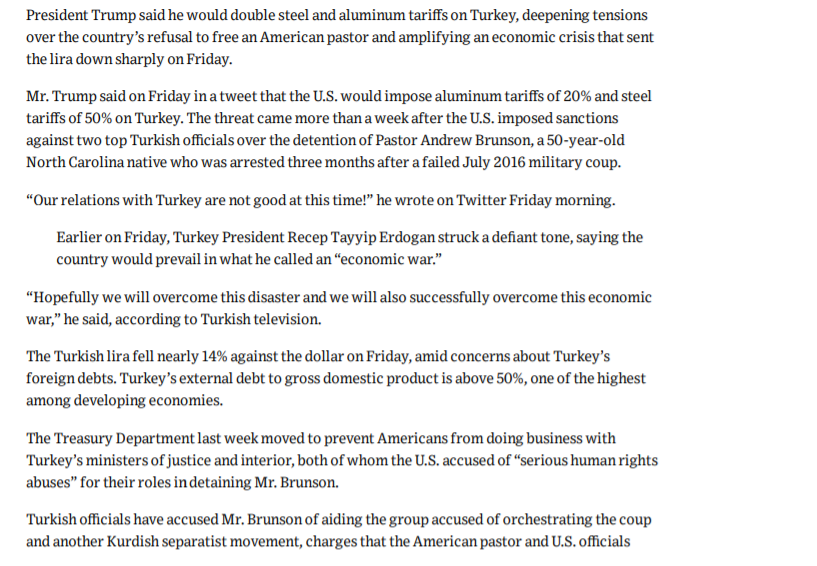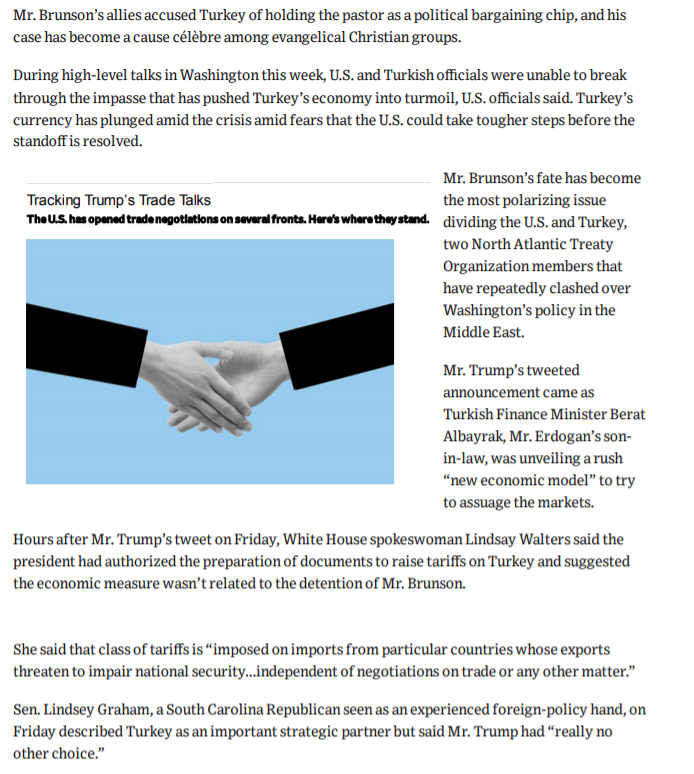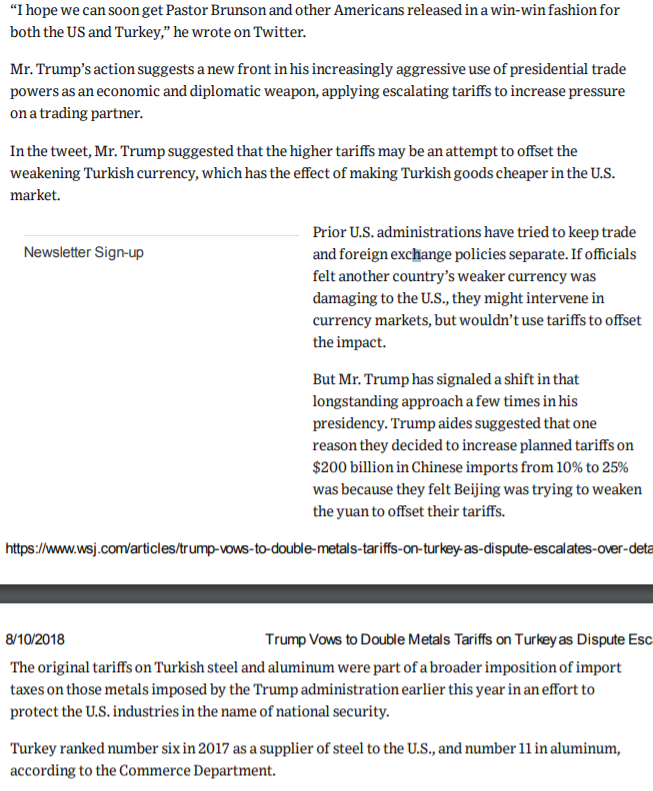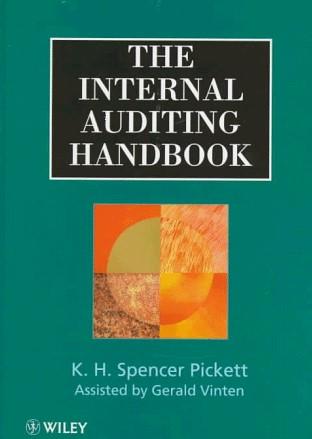



Please read the WSJ article ( article above) available. After reading the WJ article, please answer the following questions. You may read other articles relating to this issue in order to answer the below questions. Please note that your submission should not exceed 500 words.
- How will you characterize the tariffs
- Variable costs or fixed costs?
- Product or period costs; if you classify these costs as product costs, which category of product cost will you classify them as materials, labor or overhead?
- Will all companies in the US be impacted? Why or why not?
- What do you think the companies can do in order to reduce the impact of the tariffs?
- Will the tariffs impact companies located outside the US? How?
President Trump said he would double steel and aluminum tariffs on Turkey, deepening tensions over the country's refusal to free an American pastor and amplifying an economic crisis that sent the lira down sharply on Friday. Mr. Trump said on Friday in a tweet that the U.S. would impose aluminum tariffs of 20% and steel tariffs of 50% on Turkey. The threat came more than a week after the U.S. imposed sanctions against two top Turkish officials over the detention of Pastor Andrew Brunson, a 50-year-old North Carolina native who was arrested three months after a failed July 2016 military coup. "Our relations with Turkey are not good at this time!" he wrote on Twitter Friday morning. Earlier on Friday, Turkey President Recep Tayyip Erdogan struck a defiant tone, saying the country would prevail in what he called an "economic war." "Hopefully we will overcome this disaster and we will also successfully overcome this economic war," he said, according to Turkish television. The Turkish lira fell nearly 14% against the dollar on Friday, amid concerns about Turkey's foreign debts. Turkey's external debt to gross domestic product is above 50%, one of the highest among developing economies. The Treasury Department last week moved to prevent Americans from doing business with Turkey's ministers of justice and interior, both of whom the U.S. accused of "serious human rights abuses" for their roles in detaining Mr. Brunson. Turkish officials have accused Mr. Brunson of aiding the group accused of orchestrating the coup and another Kurdish separatist movement, charges that the American pastor and U.S. officials Mr. Brunson's allies accused Turkey of holding the pastor as a political bargaining chip, and his case has become a cause clbre among evangelical Christian groups. During high-level talks in Washington this week, U.S. and Turkish officials were unable to break through the impasse that has pushed Turkey's economy into turmoil, U.S. officials said. Turkey's currency has plunged amid the crisis amid fears that the U.S. could take tougher steps before the standoff is resolved. Mr. Brunson's fate has become Tracking Trump's Trade Talks the most polarizing issue The U.S. has opened trade negotiations on several fronts. Here's where they stand. dividing the U.S. and Turkey, two North Atlantic Treaty Organization members that have repeatedly clashed over Washington's policy in the Middle East. Mr. Trump's tweeted announcement came as Turkish Finance Minister Berat Albayrak, Mr. Erdogan's son- in-law, was unveiling a rush "new economic model to try to assuage the markets. Hours after Mr. Trump's tweet on Friday, White House spokeswoman Lindsay Walters said the president had authorized the preparation of documents to raise tariffs on Turkey and suggested the economic measure wasn't related to the detention of Mr. Brunson. She said that class of tariffs is "imposed on imports from particular countries whose exports threaten to impair national security...independent of negotiations on trade or any other matter." Sen. Lindsey Graham, a South Carolina Republican seen as an experienced foreign policy hand, on Friday described Turkey as an important strategic partner but said Mr. Trump had "really no other choice." "I hope we can soon get Pastor Brunson and other Americans released in a win-win fashion for both the US and Turkey," he wrote on Twitter. Mr. Trump's action suggests a new front in his increasingly aggressive use of presidential trade powers as an economic and diplomatic weapon, applying escalating tariffs to increase pressure on a trading partner. In the tweet, Mr. Trump suggested that the higher tariffs may be an attempt to offset the weakening Turkish currency, which has the effect of making Turkish goods cheaper in the U.S. market. Newsletter Sign-up Prior U.S. administrations have tried to keep trade and foreign exchange policies separate. If officials felt another country's weaker currency was damaging to the U.S., they might intervene in currency markets, but wouldn't use tariffs to offset the impact. But Mr. Trump has signaled a shift in that longstanding approach a few times in his presidency. Trump aides suggested that one reason they decided to increase planned tariffs on $200 billion in Chinese imports from 10% to 25% was because they felt Beijing was trying to weaken the yuan to offset their tariffs. https://www.wsj.com/articles/trump-vows-to-double-metals-tariffs-on-turkey-as-dispute-escalates-over-deta 8/10/2018 Trump Vows to Double Metals Tariffs on Turkey as Dispute Esc The original tariffs on Turkish steel and aluminum were part of a broader imposition of import taxes on those metals imposed by the Trump administration earlier this year in an effort to protect the U.S. industries in the name of national security. Turkey ranked number six in 2017 as a supplier of steel to the U.S., and number 11 in aluminum, according to the Commerce Department. Turkish trade minister Ruhsar Pekcan said Friday that Turkey was "deeply disappointed" by Mr. Trump's decision, and called on Mr. Trump to resume talks. "The tariffs were groundless when they were announced in June, and remain so now," she said. "The effects of this ill-advised action by the U.S. administration will not only impact Turkey, but will prove detrimental to American companies and workers as well." President Trump said he would double steel and aluminum tariffs on Turkey, deepening tensions over the country's refusal to free an American pastor and amplifying an economic crisis that sent the lira down sharply on Friday. Mr. Trump said on Friday in a tweet that the U.S. would impose aluminum tariffs of 20% and steel tariffs of 50% on Turkey. The threat came more than a week after the U.S. imposed sanctions against two top Turkish officials over the detention of Pastor Andrew Brunson, a 50-year-old North Carolina native who was arrested three months after a failed July 2016 military coup. "Our relations with Turkey are not good at this time!" he wrote on Twitter Friday morning. Earlier on Friday, Turkey President Recep Tayyip Erdogan struck a defiant tone, saying the country would prevail in what he called an "economic war." "Hopefully we will overcome this disaster and we will also successfully overcome this economic war," he said, according to Turkish television. The Turkish lira fell nearly 14% against the dollar on Friday, amid concerns about Turkey's foreign debts. Turkey's external debt to gross domestic product is above 50%, one of the highest among developing economies. The Treasury Department last week moved to prevent Americans from doing business with Turkey's ministers of justice and interior, both of whom the U.S. accused of "serious human rights abuses" for their roles in detaining Mr. Brunson. Turkish officials have accused Mr. Brunson of aiding the group accused of orchestrating the coup and another Kurdish separatist movement, charges that the American pastor and U.S. officials Mr. Brunson's allies accused Turkey of holding the pastor as a political bargaining chip, and his case has become a cause clbre among evangelical Christian groups. During high-level talks in Washington this week, U.S. and Turkish officials were unable to break through the impasse that has pushed Turkey's economy into turmoil, U.S. officials said. Turkey's currency has plunged amid the crisis amid fears that the U.S. could take tougher steps before the standoff is resolved. Mr. Brunson's fate has become Tracking Trump's Trade Talks the most polarizing issue The U.S. has opened trade negotiations on several fronts. Here's where they stand. dividing the U.S. and Turkey, two North Atlantic Treaty Organization members that have repeatedly clashed over Washington's policy in the Middle East. Mr. Trump's tweeted announcement came as Turkish Finance Minister Berat Albayrak, Mr. Erdogan's son- in-law, was unveiling a rush "new economic model to try to assuage the markets. Hours after Mr. Trump's tweet on Friday, White House spokeswoman Lindsay Walters said the president had authorized the preparation of documents to raise tariffs on Turkey and suggested the economic measure wasn't related to the detention of Mr. Brunson. She said that class of tariffs is "imposed on imports from particular countries whose exports threaten to impair national security...independent of negotiations on trade or any other matter." Sen. Lindsey Graham, a South Carolina Republican seen as an experienced foreign policy hand, on Friday described Turkey as an important strategic partner but said Mr. Trump had "really no other choice." "I hope we can soon get Pastor Brunson and other Americans released in a win-win fashion for both the US and Turkey," he wrote on Twitter. Mr. Trump's action suggests a new front in his increasingly aggressive use of presidential trade powers as an economic and diplomatic weapon, applying escalating tariffs to increase pressure on a trading partner. In the tweet, Mr. Trump suggested that the higher tariffs may be an attempt to offset the weakening Turkish currency, which has the effect of making Turkish goods cheaper in the U.S. market. Newsletter Sign-up Prior U.S. administrations have tried to keep trade and foreign exchange policies separate. If officials felt another country's weaker currency was damaging to the U.S., they might intervene in currency markets, but wouldn't use tariffs to offset the impact. But Mr. Trump has signaled a shift in that longstanding approach a few times in his presidency. Trump aides suggested that one reason they decided to increase planned tariffs on $200 billion in Chinese imports from 10% to 25% was because they felt Beijing was trying to weaken the yuan to offset their tariffs. https://www.wsj.com/articles/trump-vows-to-double-metals-tariffs-on-turkey-as-dispute-escalates-over-deta 8/10/2018 Trump Vows to Double Metals Tariffs on Turkey as Dispute Esc The original tariffs on Turkish steel and aluminum were part of a broader imposition of import taxes on those metals imposed by the Trump administration earlier this year in an effort to protect the U.S. industries in the name of national security. Turkey ranked number six in 2017 as a supplier of steel to the U.S., and number 11 in aluminum, according to the Commerce Department. Turkish trade minister Ruhsar Pekcan said Friday that Turkey was "deeply disappointed" by Mr. Trump's decision, and called on Mr. Trump to resume talks. "The tariffs were groundless when they were announced in June, and remain so now," she said. "The effects of this ill-advised action by the U.S. administration will not only impact Turkey, but will prove detrimental to American companies and workers as well










